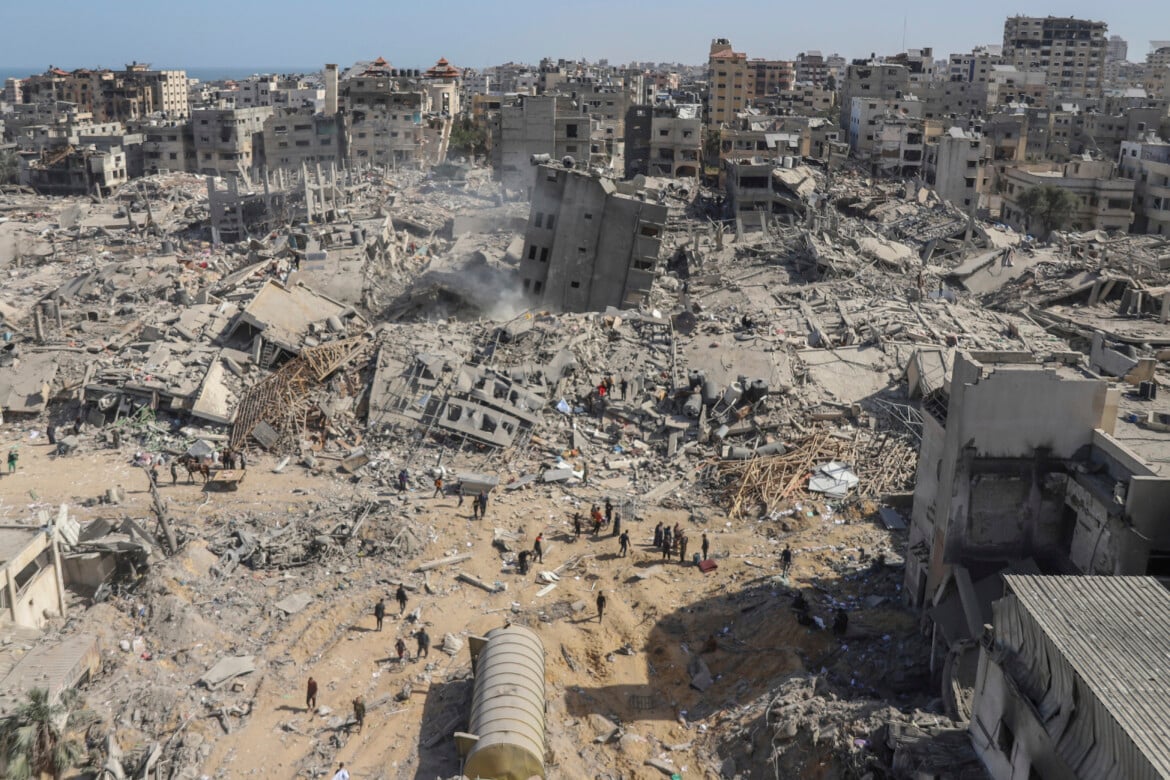Reportage
Surviving the genocide in Gaza City
Death is everywhere: under the bombs, in the search for food, in the famine. Starving the inhabitants and forcibly removing them from their lives is part of a larger plan to annex northern Gaza after emptying it of its population.

The repetitive images that pop up on your cell phone like punches to the gut show maps with areas marked out with lines in toxic yellow and with icons, symbols, and indications of access or restrictions. It all means you have to abandon once again the “home” you’ve found for the nth time. But it’s not home. It’s only tents or temporary shelters from which people scatter away like atoms gone mad. Your real home is already long gone.
As evacuation orders from the Israeli army force thousands of people onto the roads, carts made from iron, wood and car wheels, pulled by donkeys, are one of the few means of escape. Crammed like sardines, for pennies, people move from place to place, with no real destination. “My donkey died in Gaza City, hit by shrapnel,” Abdel tells us. ”Nowadays a donkey is more valuable than gold.”
People are hungry, exhausted and forced to move with bombs falling overhead. Torn-up roads and gutted buildings have rendered entire villages unrecognizable. These are the repeated massacres in the northern Gaza Strip, which are hitting the descendants of Nakba refugees like they did their forefathers.
There are images of human beings staggering around in shock, covered in the dust of what was once their homes. And one thing is clear: the people paying the price for the war are the Palestinians.
In Gaza, where there is no longer any distinction between a human being, a building or a tree, in the midst of destruction, massacres and complete misery, one must always question everything, one must always doubt all the figures, of the dead, the wounded, the displaced. “There are no safe paths. We cannot move because there are soldiers firing and drones that never stop,” they tell us.
What does fear smell like? The streets smell of rot and death, sewage and explosives. Rats, scorpions, flies, lice and mosquitoes live among sewage water and trash. In the end, even the ashes continue to burn, lit up by the unquenchable fire of war.
No water or food has come in for weeks. Death is everywhere: under the bombs, in the search for food, in the famine. Starving the inhabitants and forcibly removing them from their lives is part of a larger plan to annex northern Gaza after emptying it of its population. And, since the Israeli hostages are not high on Tel Aviv's military agenda, every location is a legitimate target for fighter planes.
Buildings lie in piles of rubble against a cold blue sky. A group of men emerges near a building that was standing until moments before Israeli air strikes razed it to the ground like a toy house. They are carrying a little girl on a makeshift stretcher, 9 or 10 years old, completely covered in dust – her hair, her pants – shouting to anyone in their path to clear the way. And the little girl asks in Arabic, “Are you taking me to the cemetery?” Even if the language itself could be successfully translated, collected and transported intact from one world to another, it would pale, fail, wither away.
There is no electricity, there are no kindergartens, no schools, no universities. There is nothing left. And this is the real war: being forced to live with your family in an empty, deserted place where there is absolutely nothing left.
Bisan is dead now. He was killed by a war machine that makes no distinction between targets. He was at the port of Gaza City. It’s a place where famine reigns. There is nothing to eat, not even from a can. A kilo of tomatoes, on the rare occasions when it is available, costs 400 shekels (about €100). There is no meat, no chicken, no food aid. Hunger is being used as a weapon. As a result, many people go fishing in the harbor, where they can catch bouri, mullet. It’s a good fish if caught in the open sea, but in the harbors it feeds on sewage.
Bassma, 4 years old, Bisan's daughter, has lost her support. She just wants to eat her maamoul with her daddy. People die suddenly, annihilated by a bomb. But people also die of exhaustion. Of fear. Of broken hearts. Children who lose their parents lose their future. No one else can play the role of father or mother. “My husband was the pillar of the family, the pillar of this tent,” Nabila tells us. There are thousands of ways to share joy, but none for grief: that is yours alone. “We are filled with all that is missing.” How do you go through absence without getting lost, without ending up in its domain forever?
This is total destruction of society, not only on a material level. Because of the war, emotions have gone to last place in the order of priorities. It’s difficult to give affection when you spend the whole day looking for a tent, finding something to eat, fetching water, bringing it back. Affection has become rare, because it’s as if you’re always trapped in a giant blender, spinning and squandering all your attention, forcing everyone to focus on one thing alone: survival.
In this genocide, survival takes precedence over everything.
Originally published at https://ilmanifesto.it/sopravvivere-al-genocidio-a-gaza-c on 2024-12-06
